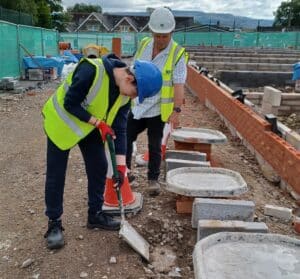Community Benefits aim to create additional opportunities in public contracts that positively impact the community, ensuring better value for the money spent. They focus on building stronger communities, reducing social exclusion and poverty, and boosting economic development.
These benefits help support the social, economic, and environmental well-being of the community. They ensure public money is used effectively, contributing to maximum value.
What are the key components of community benefits?
Neath Port Talbot Council is committed to providing sustainable employment and training to help people into work, referred to as Targeted Recruitment and Training (TR&T), which will add value to the surrounding area (i.e., around the Project site) and the wider Counties. Where appropriate, these opportunities may be required through the medium of English and Welsh.
A target of a minimum of 52 person-weeks of Targeted Recruitment and Training is set at the framework level for every £1 million spent. This includes apprenticeships, work experience, training, and/or employment for disadvantaged groups, the long-term unemployed, NEETs, people with disabilities, and those who are economically inactive.
This is the minimum number of weeks each Council would accept. We would expect the successful contractor(s) to work in partnership with the Council to maximise the training and recruitment opportunities realised. To optimise this target and ensure transparency, the successful contractor(s) will be required to submit their work programme to the Council to see where the planned placements/trainees will be undertaken.
The successful contractor(s) will be expected to track and monitor the progress and success of any trainees/placements in their future training or employment endeavours.
Opportunities for unwaged work experience may be required for candidates identified by the Council’s agreed sources.
Successful Contractor(s) must ask sub-contractor(s) to contribute to the training requirements on any project. It is the successful Contractor(s) responsibility to develop a working method with the sub-contractor(s) and supply chain that will deliver the targeted recruitment and training requirements, supply-chain opportunities, additional sustainable benefits and related monitoring and verification data, as well as to obtain the full co-operation of sub-contractor(s) and suppliers in delivering these requirements.
NPTCBC aims to ensure a positive local impact and expects the successful contractor to support these objectives, focusing on the circular and foundational economy. This approach encourages shorter supply chains and a more local and regional focus on sourcing materials.
Contractor(s) will be expected to engage with SME’s, offering opportunities for them to bid for sub-contracting work.
Contractor(s) will also be expected to offer mentoring/business development support to help SMEs tender for work. Contractor(s) are sometimes expected to hold ‘Meet the Buyer’ events to offer businesses an opportunity to become part of their supply chain.
Successful contractor(s) are expected to engage positively with school-age children, including engagement with students of all ages learning through the medium of English and Welsh. These may include, but are not limited to:
• Contribute to increasing young people’s knowledge of the construction sector, including involvement in careers events, talks to school pupils and college learners regarding career prospects, training needed, and entry requirements.
• Contribute to increasing college and university students’ knowledge of the construction sector, including career prospects, training needed, and entry requirements.
• Help to raise the awareness of skills required for the construction and engineering sector, specifically around the STEM subjects (Science, Technology, Engineering & Mathematics) initiatives in schools and colleges.
Successful contractor(s) are expected to deliver meaningful community initiatives that would benefit the surrounding communities around the project site to address the challenges of deprivation, make a positive socio-economic impact, and promote the Welsh language. These may include, but are not limited to:
• Volunteering days
• Landscaping and building services support to regenerate communal areas
• Provide support for local charities and other community groups
• Sponsorship of sporting tournaments, e.g., rugby or football, etc
• Provide community newsletters advising on the impact of the works, etc.
Successful contractors are expected to engage with local communities and educational institutions in the promotion of positive environmental and sustainability measures. These may include, but are not limited to:
• Consider the donation of surplus material and equipment to local schools and community groups, towards eco activities such as bug hotels, raised vegetable and fruit beds.
• Engage with local re-use platforms to access/donate refurbished, recycled, and remanufactured goods
• Promote sharing, waste prevention, and re-use, and support the re-use, repair, and remanufacturing sectors in local communities.
• Donation of plants, trees, and flowers to local groups/schools and wildlife activities.
• Workshops on sustainability and the circular economy to help local businesses reduce waste and their carbon footprint
Community Benefits Projects

Community Benefits: Building More Than Just Walls at Coedffranc Primary!
We’re excited to spotlight the incredible community benefit work taking place alongside the construction of a brand-new kitchen and dining block at Coedffranc Primary School

Cyfle Apprentices – Neath College
Interview with Euros Griffiths, Cyfle Apprentice coordinator. Laura Evans, Coastal Apprentice and Roman Prosser Apprentice in Construction Engineering. https://youtu.be/Klw4MAV3Hs0?si=zagwskUX-OFUUExs

Dyffryn Rhondda Colliery Tip Stabilisation: A Commitment to Social Value and Community Engagement
Dyffryn Rhondda Colliery Tip Stabilisation: A Commitment to Social Value and Community Engagement Neath Port Talbot Council consider community benefits to be defined as the